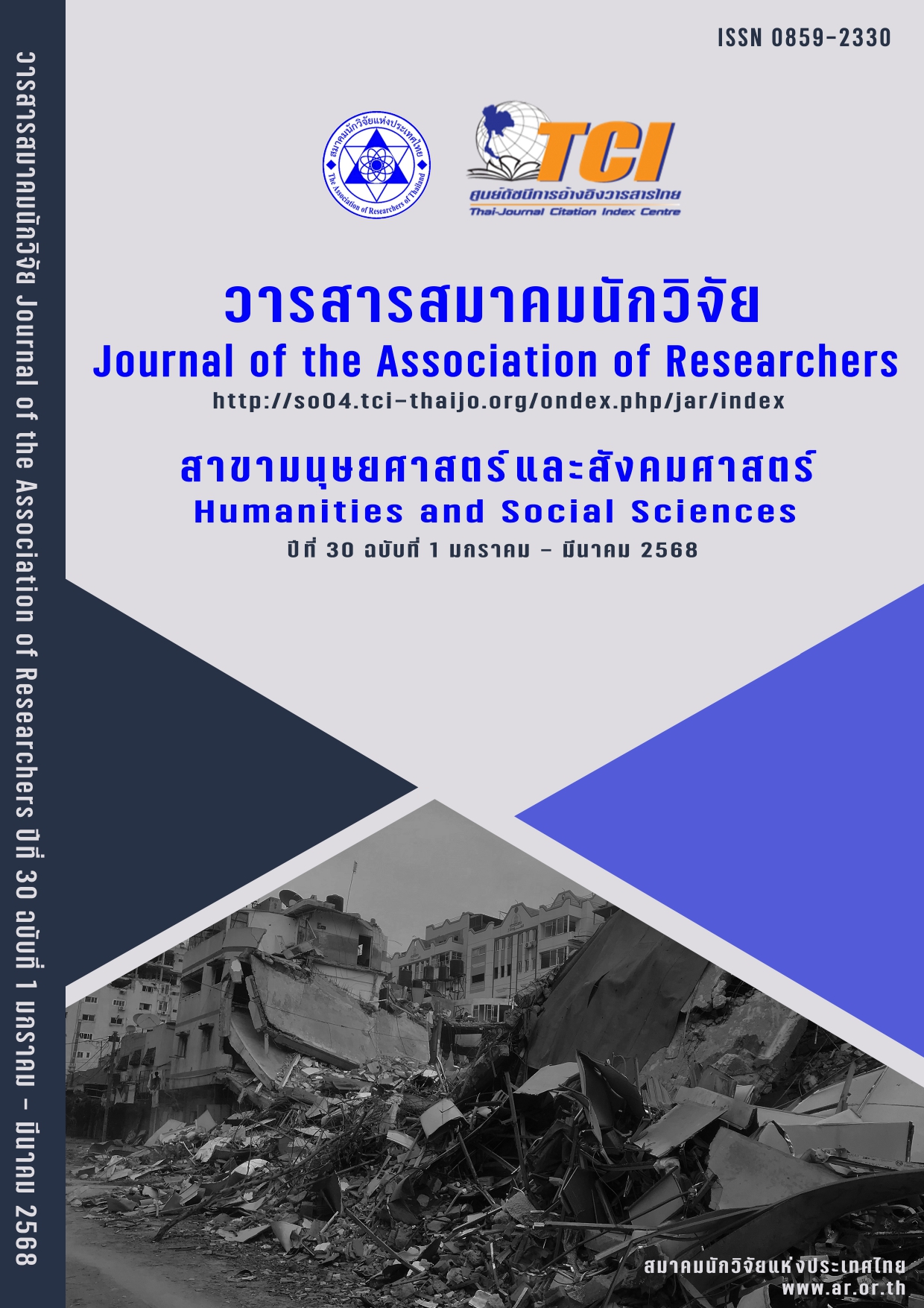Factors affecting school administration for citizenship in the 21st century of schools under Bangkok Metropolitan Administration
Main Article Content
Abstract
This research article objective to 1) study the desired conditions of school administration for citizenship in the 21st century of schools under Bangkok and 2) study factors affecting school administration for citizenship in the 21st century. Schools under Bangkok The research sample consisted of 364 secondary school teachers in Bangkok, which were obtained from simple random sampling. Using a questionnaire as a tool to collect data. Data were analyzed using frequency, percentage, mean and standard deviation. The research results found that Overall, the desired conditions of school administration are at the highest level. has an average of 4.45 and the external environment of the administration that affects school administration for citizenship in the 21st century as a whole is at a high level has an average of 4.34. Suggestions School administrators can use the research results to develop learners in terms of citizenship in the 21st century through short-term, medium-term, and long-term planning by designing and organizing electronic data, managing existing technology for maximum benefit. School administrators promote policies on the development of learning plans aimed at developing learners to be global citizens, national citizens, and digital citizens. They promote the application of technology in teaching and learning in the form of Smart Classrooms to access new forms of textbook content. They promote the application of technology for self-learning. In-depth research on learning management to develop global citizenship and the development of school curricula that are appropriate for the context or vision of the school should be conducted, while increasing the role of digital citizenship.
Article Details

This work is licensed under a Creative Commons Attribution-NonCommercial-NoDerivatives 4.0 International License.
บทความที่ปรากฏในวารสารนี้ เป็นความรับผิดชอบของผู้เขียน ซึ่งสมาคมนักวิจัยไม่จำเป็นต้องเห็นด้วยเสมอไป การนำเสนอผลงานวิจัยและบทความในวารสารนี้ไปเผยแพร่สามารถกระทำได้ โดยระบุแหล่งอ้างอิงจาก "วารสารสมาคมนักวิจัย"
References
ศิริชัย กาญจนวาสี. (2545). ทฤษฎีการประเมิน. พิมพ์ครั้งที่ 3. กรุงเทพฯ. สำนักพิมพ์แห่งจุฬาลงกรณ์.
Bennett, S., et al. (2008). The 'digital natives' debate: A critical review of the evidence. British Journal of Educational Technology, 39(5), 775-786. https://doi.org/ 10.1111/j.1467-8535.2007.00793.x.
Best, J., W. (1970). Research in Education. New Jersey: Prentice-Hill.
Candy, P., C. (2000). Knowledge navigators and lifelong learners: Producing graduates for the information society. Higher Education Research & Development, 19(3), 261-277.
Hague, C., & Payton, S. (2010). Digital literacy across the curriculum. Bristol: Futurelab.
Hinduja, S., & Patchin, J. W. (2014). Cyberbullying prevention and response: Expert perspectives. Routledge.
Jenkins, H., et al. (2009). Confronting the challenges of participatory culture: Media education for the 21st century. MIT Press. Retrieved fromhttps://www.macfound.org/media /article_pdfs/JENKINS_WHITE_PAPER. PDF.
Orr, D. W. (1992). Ecological literacy: Education and the transition to a postmodern world. SUNY Press.
Partnership for 21st Century Skills. (2009). P21 framework definitions. Washington, DC: Partnership for 21st Century Skills.
Ribble, M. (2015). Digital citizenship in schools: Nine elements all students should know (3rd ed.). International Society for Technology in Education (ISTE).
Rideout, V. J., et al (2010). Generation M2: Media in the lives of 8- to 18-year-olds. Kaiser Family Foundation. Retrieved from https://www.kff.org/wpcontent/uploads/2013 /04/8010.pdf.
Robinson, K. (2011). Out of our minds: Learning to be creative. Capstone.
Trilling, B., & Fadel, C. (2009). 21st century skills: Learning for life in our times. John Wiley & Sons.
UNESCO. (2015). Education for all 2000-2015: Achievements and challenges. Paris: UNESCO.
World Bank. (2020). World development report 2020: The real wealth of nations: Pathways to human development. Washington, DC: World Bank.
Translates in Thai Reference
Kanchanawasi, S. (2002). Evaluation Theory. 3rd ed. Bangkok: Chulalongkorn University Press. (in Thai).


